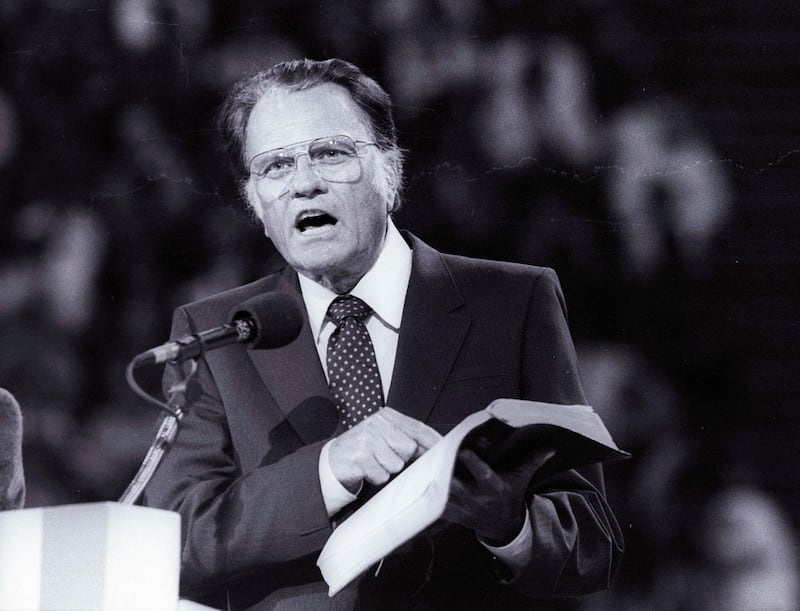Billy Graham, the Christian evangelist who preached to more than 200 million people in 185 countries and became the confidant of world leaders including every US president from Harry Truman to George W. Bush, has died. He was 99.
He died Wednesday at his home in Montreat, North Carolina, according to a spokesman, Mark DeMoss.
Graham had reduced his public appearances in the 1990s after developing Parkinson’s disease. He also suffered from hydrocephaly, or water on the brain, and prostate cancer.
With his lanky frame, wavy hair and chiseled features, Graham gave sermons with a riveting, rapid-fire delivery that earned him the nickname "God’s machine gun." His ability to publicise his crusades for half a century through all forms of media - radio, television, movies and the Internet - helped make him one of the most influential evangelists in history. For five decades, he made Gallup's list of most admired people.
His reputation as "chaplain to the White House" gained him access not only to US presidents but to countries untouched by evangelical Christianity, and to leaders such as Winston Churchill, Mikhail Gorbachev and Pope John Paul II. He was a fixture at presidential inaugurations and other national ceremonies, delivering the sermon at the National Prayer Service on September 14, 2001, in memory of the victims of the September 11 terrorist attacks.
"Here's one of the most famous people in the world, and in his presence you realise how humble he is," Bush said in 2010, recalling how a 1985 meeting with Graham gave him inspiration and direction in his life. His humility and obviously his love for God and Christ can overwhelm the cynic. And I was a cynical person at the time, and his spirit overwhelmed me."
Graham helped create a movement comprising a mix of denominations, from southern Baptists to Assemblies of God, representing an estimated 60 million Americans who consider themselves "born again." A southern Baptist himself, he followed fundamentalist theology that personal salvation comes through faith in Jesus Christ. He cooperated with, instead of condemned, other churches and invited them to participate in his crusades.
In 2001, Graham designated his son Franklin as his successor to run the Billy Graham Evangelistic Association.
Graham's preaching, whether from small churches or stadiums, remained the bread-and-butter of his ministry. He conducted more than 400 crusades. One in 1957, at New York City's Madison Square Garden, drew more than 2.5 million people from mid-May to Labor Day. It was the first Graham revival broadcast on TV.
From the 1970s to the 1990s, he focused on world crusades. A 1973 five-day outdoor revival in Seoul drew 1.2 million people. Graham was quick to visit the former eastern bloc after the fall of the Berlin Wall in 1989.
He wrote about three dozen books. The 800,000-copy first edition of "How to Be Born Again" (1977) was said to be the largest initial printing in publishing history at the time. Graham published his memoirs, "Just as I Am," in 1997.
At the 2007 dedication of his library, Graham told the crowd that the building, which cost $27 million and occupies 40,000 square feet, glorified him beyond his desires.
"My whole life has been to please the Lord and honour Jesus," he said, "not to see me and think of me."
Ruth Bell Graham, his wife of more than 60 years and most trusted adviser, died in June 2007.
In addition to Franklin, the couple had another son, Nelson, and three daughters, Anne, Ruth and Virginia. They survive him, as does his sister, Jean Ford, plus 19 grandchildren and numerous great-grandchildren.





